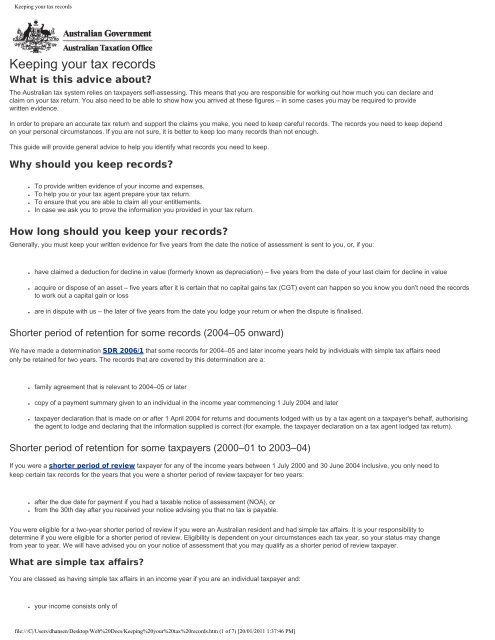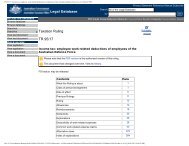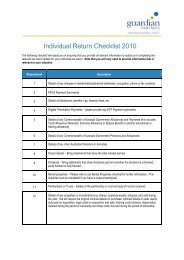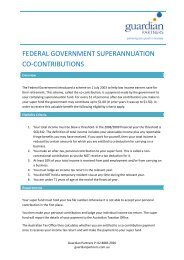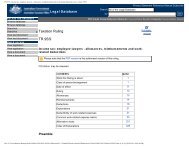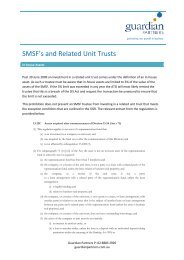Keeping your tax records - Guardian Partners
Keeping your tax records - Guardian Partners
Keeping your tax records - Guardian Partners
You also want an ePaper? Increase the reach of your titles
YUMPU automatically turns print PDFs into web optimized ePapers that Google loves.
<strong>Keeping</strong> <strong>your</strong> <strong>tax</strong> <strong>records</strong><br />
<strong>Keeping</strong> <strong>your</strong> <strong>tax</strong> <strong>records</strong><br />
What is this advice about?<br />
The Australian <strong>tax</strong> system relies on <strong>tax</strong>payers self-assessing. This means that you are responsible for working out how much you can declare and<br />
claim on <strong>your</strong> <strong>tax</strong> return. You also need to be able to show how you arrived at these figures – in some cases you may be required to provide<br />
written evidence.<br />
In order to prepare an accurate <strong>tax</strong> return and support the claims you make, you need to keep careful <strong>records</strong>. The <strong>records</strong> you need to keep depend<br />
on <strong>your</strong> personal circumstances. If you are not sure, it is better to keep too many <strong>records</strong> than not enough.<br />
This guide will provide general advice to help you identify what <strong>records</strong> you need to keep.<br />
Why should you keep <strong>records</strong>?<br />
●<br />
●<br />
●<br />
●<br />
To provide written evidence of <strong>your</strong> income and expenses.<br />
To help you or <strong>your</strong> <strong>tax</strong> agent prepare <strong>your</strong> <strong>tax</strong> return.<br />
To ensure that you are able to claim all <strong>your</strong> entitlements.<br />
In case we ask you to prove the information you provided in <strong>your</strong> <strong>tax</strong> return.<br />
How long should you keep <strong>your</strong> <strong>records</strong>?<br />
Generally, you must keep <strong>your</strong> written evidence for five years from the date the notice of assessment is sent to you, or, if you:<br />
●<br />
have claimed a deduction for decline in value (formerly known as depreciation) – five years from the date of <strong>your</strong> last claim for decline in value<br />
●<br />
acquire or dispose of an asset – five years after it is certain that no capital gains <strong>tax</strong> (CGT) event can happen so you know you don't need the <strong>records</strong><br />
to work out a capital gain or loss<br />
●<br />
are in dispute with us – the later of five years from the date you lodge <strong>your</strong> return or when the dispute is finalised.<br />
Shorter period of retention for some <strong>records</strong> (2004–05 onward)<br />
We have made a determination SDR 2006/1 that some <strong>records</strong> for 2004–05 and later income years held by individuals with simple <strong>tax</strong> affairs need<br />
only be retained for two years. The <strong>records</strong> that are covered by this determination are a:<br />
●<br />
family agreement that is relevant to 2004–05 or later<br />
●<br />
copy of a payment summary given to an individual in the income year commencing 1 July 2004 and later<br />
●<br />
<strong>tax</strong>payer declaration that is made on or after 1 April 2004 for returns and documents lodged with us by a <strong>tax</strong> agent on a <strong>tax</strong>payer's behalf, authorising<br />
the agent to lodge and declaring that the information supplied is correct (for example, the <strong>tax</strong>payer declaration on a <strong>tax</strong> agent lodged <strong>tax</strong> return).<br />
Shorter period of retention for some <strong>tax</strong>payers (2000–01 to 2003–04)<br />
If you were a shorter period of review <strong>tax</strong>payer for any of the income years between 1 July 2000 and 30 June 2004 inclusive, you only need to<br />
keep certain <strong>tax</strong> <strong>records</strong> for the years that you were a shorter period of review <strong>tax</strong>payer for two years:<br />
●<br />
●<br />
after the due date for payment if you had a <strong>tax</strong>able notice of assessment (NOA), or<br />
from the 30th day after you received <strong>your</strong> notice advising you that no <strong>tax</strong> is payable.<br />
You were eligible for a two-year shorter period of review if you were an Australian resident and had simple <strong>tax</strong> affairs. It is <strong>your</strong> responsibility to<br />
determine if you were eligible for a shorter period of review. Eligibility is dependent on <strong>your</strong> circumstances each <strong>tax</strong> year, so <strong>your</strong> status may change<br />
from year to year. We will have advised you on <strong>your</strong> notice of assessment that you may qualify as a shorter period of review <strong>tax</strong>payer.<br />
What are simple <strong>tax</strong> affairs?<br />
You are classed as having simple <strong>tax</strong> affairs in an income year if you are an individual <strong>tax</strong>payer and:<br />
●<br />
<strong>your</strong> income consists only of<br />
file:///C|/Users/dhansen/Desktop/Web%20Docs/<strong>Keeping</strong>%20<strong>your</strong>%20<strong>tax</strong>%20<strong>records</strong>.htm (1 of 7) [20/01/2011 1:37:46 PM]
<strong>Keeping</strong> <strong>your</strong> <strong>tax</strong> <strong>records</strong><br />
❍<br />
❍<br />
❍<br />
salary or wages<br />
interest paid by a financial institution or government body<br />
dividends from an Australian company that is listed on the Australian Stock Exchange (ASX)<br />
●<br />
you claim deductions only for<br />
❍ managing <strong>your</strong> <strong>tax</strong> affairs<br />
❍ bank fees and charges, including <strong>tax</strong>es and duties<br />
❍ deductible gifts of money and donations of money<br />
●<br />
you are not<br />
❍ a non-resident of Australia for the year of income<br />
❍ entitled to a foreign <strong>tax</strong> credit<br />
❍ required to adjust <strong>your</strong> <strong>tax</strong>able income because of payments to or from <strong>your</strong> associates<br />
❍ in receipt of a capital gain or loss that must be taken into account in <strong>your</strong> <strong>tax</strong> return<br />
❍ in receipt of foreign employment income, or income from service on an approved overseas project that is exempt from <strong>tax</strong> in Australia.<br />
What <strong>records</strong> should you keep?<br />
You should keep <strong>records</strong> in these main categories:<br />
●<br />
●<br />
●<br />
●<br />
●<br />
any payments you have received<br />
any expenses related to payments received<br />
when you have acquired or disposed of an asset – such as shares or a rental property<br />
any <strong>tax</strong> deductible gifts or donations<br />
any medical expenses.<br />
This advice tells you what main types of <strong>records</strong> you should keep in each of these categories. You may also need to keep <strong>records</strong> in some<br />
other categories, or for other members of <strong>your</strong> family – for example, if you receive the family <strong>tax</strong> benefit.<br />
Also, in some cases you may need to estimate items, such as how far you will travel during an income year. At the end of the year, if you travel more<br />
than you estimated, you may need to have kept more <strong>records</strong>.<br />
So if you’re not sure whether or not to keep a record, you should keep it – you can decide whether you need it at <strong>tax</strong> return time.<br />
Electronic <strong>records</strong><br />
Documents that you are required to keep can be in written or electronic form. If you make paper or electronic copies they must be a true and<br />
clear reproduction of the original.<br />
We recommend that if you store <strong>your</strong> <strong>records</strong> electronically you make a back-up copy to ensure the evidence is easily accessible if the original<br />
becomes inaccessible or unreadable (for example, where a hard drive is corrupted).<br />
Payments you receive<br />
Salary, wages and allowances<br />
Written evidence can include:<br />
●<br />
●<br />
<strong>your</strong> Pay as you go (PAYG) payment summary – individual non business (previously known as a group certificate)<br />
a signed letter or statement from <strong>your</strong> payer if you do not have a payment summary.<br />
Income from interest, dividends, managed funds or rental properties<br />
Written evidence can include:<br />
●<br />
statements, passbooks or other documentation from <strong>your</strong> financial institution showing the amount of interest you receive<br />
●<br />
statements from the company, corporate unit trust, public trading trust or corporate limited partnership that pays you dividends or makes distributions<br />
to you. These <strong>records</strong> should show<br />
❍ the amount of franked and unfranked dividends you receive<br />
❍ the amount of franking credits, and<br />
❍ any <strong>tax</strong> file number amounts withheld from unfranked dividends<br />
●<br />
statements or advice from the managed fund showing the amount of any distribution. The statement should show details of<br />
❍ the amount of any primary production or non-primary production income<br />
❍ any capital gains or losses<br />
file:///C|/Users/dhansen/Desktop/Web%20Docs/<strong>Keeping</strong>%20<strong>your</strong>%20<strong>tax</strong>%20<strong>records</strong>.htm (2 of 7) [20/01/2011 1:37:46 PM]
<strong>Keeping</strong> <strong>your</strong> <strong>tax</strong> <strong>records</strong><br />
❍<br />
❍<br />
any foreign income, and<br />
<strong>your</strong> share of any credits such as franking credits<br />
●<br />
<strong>records</strong> of the rent you receive, such as<br />
❍ a statement from <strong>your</strong> property agent<br />
❍ a rent book or bank statements showing rental payments transferred into <strong>your</strong> account, and<br />
❍ <strong>records</strong> of any bond money retained in place of rent.<br />
Government benefits and pensions<br />
Written evidence can include:<br />
●<br />
<strong>your</strong> PAYG payment summary – individual non business (previously known as a group certificate)<br />
●<br />
a letter from the agency that pays <strong>your</strong> allowance, pension or payment stating the amount you receive.<br />
Other pensions or annuities<br />
Written evidence can include:<br />
●<br />
<strong>your</strong> PAYG payment summary – individual non business (previously known as a group certificate)<br />
●<br />
a letter from the superannuation or pension fund, annuity or retirement savings account provider stating the amount you receive.<br />
Expenses related to payments you receive<br />
Read on for details of specific types of expenses.<br />
Car expenses<br />
The <strong>records</strong> you need to keep will depend on <strong>your</strong> estimated business kilometres travelled. However, <strong>your</strong> claim at the end of the income year will<br />
depend on <strong>your</strong> actual business kilometres. Therefore, if you cannot estimate <strong>your</strong> business kilometres, you should keep documentation as required<br />
by the logbook method. This will ensure that you will be able to make <strong>your</strong> claim under the method which gives you the greater deduction.<br />
If <strong>your</strong> estimated travel will be more than 5,000kms, you can use one of four methods:<br />
●<br />
●<br />
●<br />
●<br />
cents per kilometre method (restricted to claiming only 5,000kms)<br />
logbook method<br />
12% of original value method, or<br />
1/3 of actual expenses method.<br />
If you estimated travel will be 5,000 km or less, you can use either:<br />
●<br />
●<br />
cents per kilometre method, or<br />
logbook method<br />
Cents per kilometre method<br />
You need <strong>records</strong> showing how you calculate business kilometres travelled and the amount of the claim, for example, diary entries and documents<br />
you can use to show the engine capacity of <strong>your</strong> car.<br />
Logbook method<br />
For each year you need:<br />
●<br />
●<br />
●<br />
●<br />
odometer readings for the start and end of the period being claimed<br />
business usage percentage based on the log book<br />
receipts or other documents showing fuel and oil expenses, or a reasonable estimate based on odometer readings<br />
receipts or other documents showing other expenses for <strong>your</strong> car, for example, registration, insurance, lease payments, services, tyres, repairs,<br />
interest charges.<br />
file:///C|/Users/dhansen/Desktop/Web%20Docs/<strong>Keeping</strong>%20<strong>your</strong>%20<strong>tax</strong>%20<strong>records</strong>.htm (3 of 7) [20/01/2011 1:37:46 PM]
<strong>Keeping</strong> <strong>your</strong> <strong>tax</strong> <strong>records</strong><br />
Your logbook is valid for five years. If this is the first year you are using this method (or the five years has expired) you will need to keep a log book for<br />
this year. The logbook must cover at least 12 continuous weeks and show:<br />
●<br />
●<br />
●<br />
●<br />
●<br />
when the logbook period begins and ends<br />
the car’s odometer readings at the start and end of the logbook period<br />
the total kilometres travelled in the log book period<br />
the kilometres travelled for work activities based on journeys recorded in the logbook. In recording the journeys, you need the start and finishing times<br />
of the journey, the odometer readings at the start and end of the journey, kilometres travelled and the reason for the journey<br />
the business use percentage for the log book period.<br />
The following table sets out some of the rules about keeping logbooks in different circumstances:<br />
Circumstance<br />
First year of using logbook<br />
Using the car for less than<br />
12 weeks before the end of the<br />
income year<br />
<strong>Keeping</strong> logbooks for two or more<br />
cars<br />
Rule<br />
If this is the first year that you are using the logbook method, you must keep a logbook<br />
during this income year.<br />
If you started to use <strong>your</strong> car for work-related purposes less than 12 weeks before the<br />
end of the income year, you are able to continue to keep the logbook in the following<br />
income year so that <strong>your</strong> logbook covers the required 12 weeks.<br />
If you want to use the logbook method for two or more cars, the logbook for each car<br />
must cover the same period.<br />
12% of original value method<br />
You need either:<br />
●<br />
●<br />
sale or purchase, lease or hire purchase agreement<br />
<strong>records</strong> of how you calculate business kilometres travelled.<br />
Claims under this method are restricted to 12% of the luxury car limit in the year you first used the car:<br />
●<br />
●<br />
●<br />
$57,180 for the 2008–09 and 2009–10 income years<br />
$57,123 for the 2007–08 income year, and<br />
$57,009 for the 2002–03 to 2006–07 income years.<br />
1/3 of actual expenses method<br />
You need:<br />
●<br />
●<br />
●<br />
●<br />
●<br />
odometer readings for the start and end of the period being claimed<br />
the basis on which the business kilometres were calculated<br />
details of the make, model, engine capacity and registration of the vehicle<br />
receipts or other documents showing fuel and oil expenses or a reasonable estimate based on odometer readings<br />
receipts or other documents showing other expenses related to <strong>your</strong> car, for example, registration, insurance, lease payments, services, tyres and repairs.<br />
Read more about claiming work-related car expenses.<br />
T<br />
ravel expenses<br />
These <strong>records</strong> may include:<br />
●<br />
a travel diary – that is, a document which shows the dates, places, times and duration of <strong>your</strong> activities and travel<br />
●<br />
written evidence of <strong>your</strong> travel expenses, such as invoices, receipts or other documents showing the expense, and travel allowance details<br />
●<br />
award transport payments. If you claim up to the value of the award that was in force on 29 October 1986, no written evidence is required. If you choose<br />
file:///C|/Users/dhansen/Desktop/Web%20Docs/<strong>Keeping</strong>%20<strong>your</strong>%20<strong>tax</strong>%20<strong>records</strong>.htm (4 of 7) [20/01/2011 1:37:46 PM]
<strong>Keeping</strong> <strong>your</strong> <strong>tax</strong> <strong>records</strong><br />
to claim more than this amount, you need written evidence for the whole of the amount claimed<br />
●<br />
receipts or other documents showing actual costs incurred for using a car owned or leased by someone else – for example, petrol and oil<br />
●<br />
receipts or other documents showing the amount and date of the expenditure for vehicles other than cars, such as<br />
❍ motor cycles<br />
❍ utilities or panel vans with a carrying capacity of one tonne or more, or<br />
❍ any other vehicle with a carrying capacity of nine or more passengers<br />
●<br />
receipts or other documents (such as diary entries) for air, bus, train, tram and <strong>tax</strong>i fares, bridge and road tolls, parking and car hire fees.<br />
The documentation required for travel depends on the length of stay and whether you have received travel allowance. Where you receive travel<br />
allowance and you restrict <strong>your</strong> claim to the reasonable amount we advise each year, you do not need to keep written evidence of the expenses incurred.<br />
Read more about claiming work-related travel expenses.<br />
Clothing, uniform, dry cleaning, laundry and sun protection<br />
These <strong>records</strong> may include:<br />
● receipts or other documents showing expenses for uniforms and occupation-specific and protective clothing<br />
● a basis for <strong>your</strong> claim for laundry costs if claiming less than $150<br />
● diary entries, receipts or other documents evidencing claims greater than $150<br />
● receipts or other documents showing dry cleaning costs<br />
● receipts or other documents showing expenses for sun protection items.<br />
Read more about claiming work-related clothing, laundry and dry-cleaning expenses<br />
Self-education expenses<br />
These <strong>records</strong> may include:<br />
●<br />
receipts or other documents showing expenses such as course fees, textbooks, stationery, decline in value of and repairs to depreciating assets<br />
●<br />
receipts, documents or diary entries for travel expenses.<br />
Read more about claiming work-related self-education expenses.<br />
Other work-related expenses<br />
These <strong>records</strong> may include:<br />
●<br />
receipts, other documents or diary entries you make to record <strong>your</strong> expenses – for example, a diary maintained over a representative period to support the<br />
apportionment of computer home office costs<br />
●<br />
receipts or other documents showing expenses related to the decline in value of depreciating assets<br />
●<br />
PAYG payment summaries showing items such as union fees and overtime meal allowances.<br />
Read more about claiming other work-related expenses.<br />
Rental expenses<br />
These <strong>records</strong> may include:<br />
●<br />
documents such as bank statements showing the interest charged on money you borrowed for the rental property<br />
●<br />
receipts or other documents showing other expenses for <strong>your</strong> rental property – common examples include advertising, bank charges, council rates,<br />
file:///C|/Users/dhansen/Desktop/Web%20Docs/<strong>Keeping</strong>%20<strong>your</strong>%20<strong>tax</strong>%20<strong>records</strong>.htm (5 of 7) [20/01/2011 1:37:46 PM]
<strong>Keeping</strong> <strong>your</strong> <strong>tax</strong> <strong>records</strong><br />
gardening, property agent fees and repairs or maintenance<br />
●<br />
documents showing details of expenses related to the decline in value of depreciating assets or any capital work expenses, such as structural<br />
improvements.<br />
Read more about rent.<br />
When you have acquired or disposed of an asset<br />
If you acquire or dispose of an asset which might be subject to capital gains <strong>tax</strong>, you should keep:<br />
●<br />
documents showing the dates you acquired an asset and the date the capital gains <strong>tax</strong> (CGT) event occurred. A CGT event must occur for a capital<br />
gain or loss to arise. There are a wide range of CGT events but the most common CGT event occurs when you sell or give away an asset.<br />
Common examples of documentation are<br />
❍ contracts for the purchase or sale of an asset (such as real estate or shares), and<br />
❍ dividend reinvestment statements from <strong>your</strong> unit trust or managed investment fund<br />
●<br />
documents showing the amount and date of any expenditure for that asset. In some cases the expenditure is needed to calculate any gain or loss – for<br />
example, council rate notices for a vacant block of land<br />
●<br />
<strong>records</strong> of any net capital losses made in previous years. You may be able to offset these against capital gains in this year.<br />
Read our introduction to capital gains <strong>tax</strong>.<br />
Gifts, donations and contributions<br />
Written evidence may include:<br />
●<br />
receipts for donations or contributions<br />
●<br />
<strong>your</strong> PAYG payment summary – individual non business (previously known as a group certificate) where you make donations to eligible<br />
organisations through <strong>your</strong> pay<br />
●<br />
a signed letter from the eligible organisation confirming the amount of <strong>your</strong> donation or contribution (and the amount of the minor benefit, where you<br />
have made a deduction for a contribution where there is a minor benefit – for example, a charity dinner).<br />
Read more about claiming gifts or donations.<br />
Medical expenses<br />
Written evidence may include:<br />
●<br />
receipts or other documents to show the medical expenses you can claim – for example, payments to hospitals, doctors, dentists, opticians and<br />
chemists for expenses relating to an illness or operation<br />
●<br />
documents for any payments made to residential aged care facilities – some of these payments may be considered medical expenses<br />
●<br />
statements from Medicare or a private health fund.<br />
You should keep these documents that relate to you as well as payments made for <strong>your</strong> dependants. This generally refers to <strong>your</strong> spouse and children<br />
but may also include other dependants.<br />
Read more about claiming medical expenses.<br />
What to read/do next<br />
If you need additional help, phone us on 13 28 61.<br />
Last Modified: Wednesday, 30 June 2010<br />
file:///C|/Users/dhansen/Desktop/Web%20Docs/<strong>Keeping</strong>%20<strong>your</strong>%20<strong>tax</strong>%20<strong>records</strong>.htm (6 of 7) [20/01/2011 1:37:46 PM]
<strong>Keeping</strong> <strong>your</strong> <strong>tax</strong> <strong>records</strong><br />
Our commitment to you<br />
We are committed to providing you with accurate, consistent and clear information to help you understand <strong>your</strong> rights and entitlements and meet<br />
<strong>your</strong> obligations.<br />
If you follow our information and it turns out to be incorrect, or it is misleading and you make a mistake as a result, we will take that into account<br />
when determining what action, if any, we should take.<br />
Some of the information on this website applies to a specific financial year. This is clearly marked. Make sure you have the information for the right<br />
year before making decisions based on that information.<br />
If you feel that our information does not fully cover <strong>your</strong> circumstances, or you are unsure how it applies to you, contact us or seek professional advice.<br />
Copyright<br />
© Commonwealth of Australia<br />
This work is copyright. You may download, display, print and reproduce this material in unaltered form only (retaining this notice) for <strong>your</strong> personal,<br />
non-commercial use or use within <strong>your</strong> organisation. Apart from any use as permitted under the Copyright Act 1968, all other rights are reserved.<br />
Requests for further authorisation should be directed to the Commonwealth Copyright Administration, Copyright Law Branch, Attorney-<br />
General’s Department, Robert Garran Offices, National Circuit, BARTON ACT 2600 or posted at http://www.ag.gov.au/cca.<br />
file:///C|/Users/dhansen/Desktop/Web%20Docs/<strong>Keeping</strong>%20<strong>your</strong>%20<strong>tax</strong>%20<strong>records</strong>.htm (7 of 7) [20/01/2011 1:37:46 PM]


